MARY THELMA BABABOVICH 1905-2000
On an early Friday morning, July 7th2000, my mother Mary Thelma Babarovich, died in her sleep at the San Juan Care Center. Her 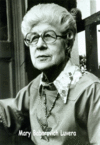 death was not unexpected. After all, she was born on December 28, 1905 and was ninety four years old when she died. She had been in failing health for some time. Her passing was, in fact, a personal blessing to her as she had been ready to meet her maker for some time.
death was not unexpected. After all, she was born on December 28, 1905 and was ninety four years old when she died. She had been in failing health for some time. Her passing was, in fact, a personal blessing to her as she had been ready to meet her maker for some time.
My sisters, Phyllis Ennes and Anita Mayer lived in Anacortes where mother was in a nursing home after dad’s death. Because they lived where she was it fell to them to provide lovingly care in her declining years at great sacrifice to themselves. So, in addition to the other factors, her death also relieved them of the obligations of care. In spite of all of this, and while I was prepared for it, I still experienced a deep sense of loss.
My father, an immigrant from Italy, had died at ninety two years old in 1990 and now, with mother’s death, there was a realization of the fact that two very usual and unique people were gone. With mother's passing an era had ended for me and for our family. We children were first generation children of an Italian immigrant and a mother whose family immigrated from the area of Split when it was part of Austria-Hungry. The two of them represented what made America great. Immigrant families who became citizens and had lived the life of the American dream.
Dad had been born in Italy and immigrated here as a youngster with his father and brother to escape the poverty of Southern Italy. They all worked for the Canadian Pacific Railroad installing railroad tracks and worked in the coal mines of Alberta until they could earn enough to send for the rest of the family. Mother’s parents had immigrated from a small island off of Split and had homesteaded on Sinclair Island surviving by farming and fishing. Both families had boot strapped themselves into a minor American success story from nothing. Having no education to speak of, speaking little English, their parents had seen the benefit of education. Mother and dad, neither of whom got much more then a sixth grade education,made sure their three children had college degrees. Married for sixty four years they had raised their children and lived in the same small town virtually their whole lives.
Mother’s parent’s story of immigration is one of great courage and sacrifice. Three brothers living on an Island, immigrated to the United States, and ended up in Washington State. All three brothers were all from the village of Splitska on the island of Brac'. Mother’s family operated a vineyard and made w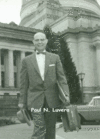 ine and olive oil which they sold to support themselves. It was the oldest boy, John, who led the way to America. He was anxious to travel to America after he had served Austria-Hungary Navy for four years and wanted to move on. In 1879 John’s father gave him the money for the ticket to sail to America and John left. After arriving he wrote home for a time, but then nothing was heard from him for about ten years. The family thought he was dead. However, one day a wine buyer came to the family farm and when he saw the name asked if they had a relative living in America because he had met someone with the same name in Seattle. It was John. So his family got his address from the buyer and his brother Peter wrote to John in America. A few months later John wrote back sending money for tickets to follow him. Spiro, Spiro’s oldest boy, Ernie, and John’s brother, Peter, my grandfather, traveled to America. After earning enough money, a year later the two brothers sent money to their wives to follow them to America. Spiro's wife, Jennie and their six children and my grandmother Marija Mattia Vulic' and their five children.
ine and olive oil which they sold to support themselves. It was the oldest boy, John, who led the way to America. He was anxious to travel to America after he had served Austria-Hungary Navy for four years and wanted to move on. In 1879 John’s father gave him the money for the ticket to sail to America and John left. After arriving he wrote home for a time, but then nothing was heard from him for about ten years. The family thought he was dead. However, one day a wine buyer came to the family farm and when he saw the name asked if they had a relative living in America because he had met someone with the same name in Seattle. It was John. So his family got his address from the buyer and his brother Peter wrote to John in America. A few months later John wrote back sending money for tickets to follow him. Spiro, Spiro’s oldest boy, Ernie, and John’s brother, Peter, my grandfather, traveled to America. After earning enough money, a year later the two brothers sent money to their wives to follow them to America. Spiro's wife, Jennie and their six children and my grandmother Marija Mattia Vulic' and their five children.
The two women and their flock of children traveled steerage on a ship to America and after clearing immigration continued their route West by train. Traveling together, speaking no English, knowing no one, the women and their children crossed the United States ending up in Burlington, Washington where they were to be picked up. My grandmother 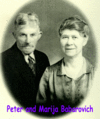 said it was night time and they were cold. There was a station master on duty. While speaking no English she communicated to him, by opening and closing the door to the pot bellied stove, that they would like to build a fire. He showed them where the kindling was kept and they made a fire. The children were thirsty and water was outside obtained by a pump and bucket. They spent the night inside station house waiting to be picked up. The next day my grandfather’s brother, John, arrived with team of horses and a wagon. All the trunks and the people were loaded aboard the wagon and pulled by horses they set off for Anacortes a bumpy, rough twenty plus mile trip.
said it was night time and they were cold. There was a station master on duty. While speaking no English she communicated to him, by opening and closing the door to the pot bellied stove, that they would like to build a fire. He showed them where the kindling was kept and they made a fire. The children were thirsty and water was outside obtained by a pump and bucket. They spent the night inside station house waiting to be picked up. The next day my grandfather’s brother, John, arrived with team of horses and a wagon. All the trunks and the people were loaded aboard the wagon and pulled by horses they set off for Anacortes a bumpy, rough twenty plus mile trip.
When they arrived at the logging and fishing town of Anacortes with its sawmills. saloons and canneries they found a main street that was a mud road with pigs and chickens running loose. My grandmother was upset at having left a comfortable farm home only to end up here. She said to John, "Is this where we are going to live?" "No," he said, "we are going to Sinclair Island." So, they spent the night in Anacortes and the next morning women, children and their tr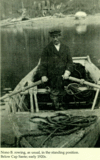 unks were loaded on the boat that delivered mail to the Islands. The boat dropped them off at tiny Sinclair Island where the brothers had established a farming homestead. After settling in for a few days, my grandmother said she asked "Where’s the school?" She was told they had none. "So, where’s the church?" she asked. There is no church either. As a religious woman who wanted her children in school, she was unhappy and a short time later John donated two acres of land for a school house location. Later a teacher was hired to teach the children. The families settled in together to operate their farm, fish and survive in this primitive setting.
unks were loaded on the boat that delivered mail to the Islands. The boat dropped them off at tiny Sinclair Island where the brothers had established a farming homestead. After settling in for a few days, my grandmother said she asked "Where’s the school?" She was told they had none. "So, where’s the church?" she asked. There is no church either. As a religious woman who wanted her children in school, she was unhappy and a short time later John donated two acres of land for a school house location. Later a teacher was hired to teach the children. The families settled in together to operate their farm, fish and survive in this primitive setting.
My grandmother was pregnant with John Babarovich, who was born on the island in 1903. He arrived unexpectedly while the others were away. My grandfather was the only one there to help with the delivery. My grandmother cut the cord herself and soon was up and working, taking care of the whole family in a place where everything was done by hard labor.
In 1904 my grandparents decided to move to Anacortes where there was a Catholic Church and a regular school. Having no boat large enough for their belongings and the family, my grandfather borrowed a scow from Ernest Kasch. Grandmother made a sail out of an old sheet and he mounted it on a mast, created a rudder and loaded it with their belongings and the whole family. He was an excellent seaman and waited for the right tide before shoving off for the trip. They traveled around Cypress and Guemes Islands and landed at the docks at Anacortes. They found a rental house and moved in. They used flour to make paste and newspaper wall paper to cover the wooden walls inside while my grandfather earned money to support them. Mother was born in Anacortes, the youngest of eight children, and attended grade school for a time before having to quit and help with the family. They built a wooden rectangular two story house in Anacortes, large enough for all the children. The kitchen was very large with a wood fired stove. A very large garden was along side the house and there were chickens as well as other animals. The kitchen was the gathering place even though there was a parlor in the front that was reserved for entertaining guests. My grandfather, Peter, was bor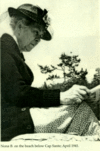 n in 1861 and died in 1935 shortly after my birth in Anacortes on February 21st. My grandmother was born in 1863 and died in 1953 at age ninety years. My grandfather Babarovich learned to read and write while in the military. He would read to my grandmother from the Bible in the evenings, but she had memorized most of the Bible anyway.
n in 1861 and died in 1935 shortly after my birth in Anacortes on February 21st. My grandmother was born in 1863 and died in 1953 at age ninety years. My grandfather Babarovich learned to read and write while in the military. He would read to my grandmother from the Bible in the evenings, but she had memorized most of the Bible anyway.
A year after my grandparents left the island, grandfather's brother Spiro (1863-1926) and his family followed them to Anacortes. The remaining brother, John, stayed on the Island but also was a commercial salmon fisherman He built the first purse seine boat in the state with engine power. His boat, Uncle John, was the first fishing boat in the area to use a purse seine net and one where the crew slept on board. Other fisherman had camps on shore where they spent the night. John was well known and very respected in his community. In fact, his 1916 monument at the Anacortes cemetery reads "Known among men as honest John."
After working in the coal mines, my grandfather Luvera, dad and his family moved to Anacortes because my grandfather had developed minor's lung disease. After saving money from working in the saw mills, Dad was able to borrow money and obtain credit from the grocery wholesale house of Reliance Foods. In 1922 he and my grandfather Nicola Luvera opened a small neighborhood grocery store, Luvera’s Fruit Store, located at 7thand Commercial streets in Anacortes. The store featured home delivery the ability to charge food on credit and extraordinary vegetable and fruit displays created by my grandfath er. Mother and dad met in Anacortes and married on April 7, 1926. They ran the store together with the help of my sisters, Anita Mayer and Phyllis Ennes as well as my minor contribution. They operated the store continuously until their retirement in 1957.
er. Mother and dad met in Anacortes and married on April 7, 1926. They ran the store together with the help of my sisters, Anita Mayer and Phyllis Ennes as well as my minor contribution. They operated the store continuously until their retirement in 1957.
While neither achieved more a grade school education at best mother and dad continually impressed upon us the importance of education. There was never any doubt we were going to college. Money earned was always earmarked "for college" They drilled it into us that education was the key to success in America. In fact, they did put all three of us children through college. While my two sisters were always outstanding students and achieved top scholastic success as well as honors in extra curricular projects, I think Dad was glad to see me just graduate from high school.
Mother and dad were married for sixty four years. While it was a typical Italian household with Dad in charge in so many ways, mother was very much her own person. While she would have denied it she was a strong advocate of independence of thought and action by women including those married to old fashioned Italian men. It’s true that dad had her visit his mother and learn the way his mother cooked before they married, but she remained a strong independent woman who was also the best cook I’ve ever encountered. In of every technique of persuasion Dad could bring o the situation she held her own views. Dad was very proud to have become an American citizen. He voted in every local state and national election. He flew the American flag in front of our home and preached to us about what a privilege it was to live in this great country. However his attempts to impose his political views on mother were rarely successful as she had her own ideas of what was the politically correct thing to vote for.
Mother was very artistic. Her water colors from grade school show great talent. She did extraordinary needlepoint work and rug hooking. She had an eye for antiques and a gift for gardening. She was also someone who was there to help. An Anacortes high school basket ball star, Jack Hawkins, had organized some of us into a neighborhood pee wee basket ball team. My friend, Pat Malloy was on the team and his uncle Bill Kasch coached a similar team in Everett. Somehow a game was arranged between the teams. We had no uniforms, so mother cut numbers and stitched them on tee shirts for our team to wear. Our team was the "termites." I don’t recall the name of the other team and I don’t recall who won the game, but I was always appreciative that thanks to mom our team had shirts with numbers and theirs didn’t.
She was so very talented in many ways. Her gardening skills were amazing. She worked very hard at raising flowers and was very well informed about varieties of flowers and plants she loved to grow. She was dedicated to her flowers and after working all day at the family neighborhood grocery store would work outside under lights to finish some project. The yard was ringed with Daffodils and she had flower bulbs that had to be brought in each Winter to be replanted in Spring. Our yard was a colorful and beautiful thing to behold.
Her rug hooking was renown. She crocheted and did needle point. She tinted dad’s early black and white photos with color. She hand mounted his slides in glass frames. She drew and colored with skill. She was an artist of many talents in many mediums. She could sew clothes and make clothes. Almost every son believes his mother was the greatest cook he knew. But her cooking skills were known throughout the community. She had a very large collection of cook books and knew how to use them. The neighborhood children called her "the cookie lady." She cooked the Italian dishes dad loved but she also cooked the wonderful old country dishes her mother taught her from their native land. We were the beneficiary of cooking from both countries.
She was a genius at antique collecting before there was much appreciation of what is now a national mania. She knew good quality and always obtained a good price for tasteful articles of furniture, glassware, tea cups and other articles. She had the eye of an artist for color and design. This was reflected in her incredible rock design at the sidewalk entry to our front door. She personally collected buckets of white and black rocks from the beach below our home until she had enough to made the project complete. She drew the design and after dad poured the footing she inserted each rock by hand to complete the design. I have seen similar things in Europe, but never one of this quality. Her cake making was legendary. Designs of castles, baseball symbols, boats and so many other creations the photographs fill many albums. After dad’s retirement and he began carving totem poles, it was mother who drew the designs, determined the color and type of paint to use and painted the poles. Mother had three children at the time of her death she had fourteen grandchildren, fifteen great grandchildren and eight nieces and nephews. Dad made my sisters a very elaborate doll house and mother made clothes for the dolls. There was very little in the way of creative things mother wasn't wonderful at doing.
My sister Phyllis has published a book of mother's recipe's In Mary Luvera's Kitchen. See my previous post about this: https://paulluverajournalonline.com/weblog/2010/03/mary-luveras-kitchen.html
So, this is in honor of Mary Thelma Babarovich who suffered much from my adolescent conduct, who so often mitigated my deserved punishment from my Italian father's discipline and who stood by me even when she didn't understand my actions. God Bless you mom.
